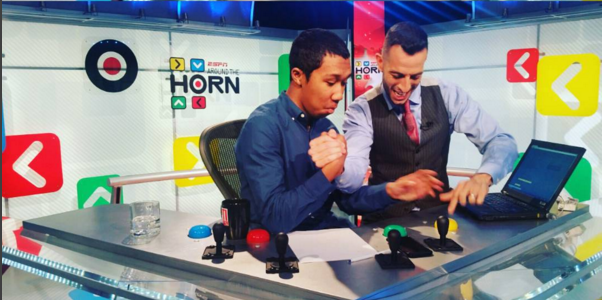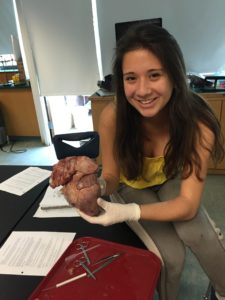To an avid sports fan, Matthew Berry, Buster Olney and Marc Stein have the world’s best job. These three sports reporters get paid to research and write about football, baseball and basketball, popular topics among 16 year olds. What is it like to crunch numbers, interview athletes and churn out sports articles? Two Lick-Wilmerding graduates offer insights.
The Background
Sean Hurd ‘12 is only in college — a senior at George Washington University in Washington, D.C., but has been working in sports journalism since graduating from high school. Hurd is not majoring in Journalism, but has held various internships with major sports news organizations and is a sports columnist for his university’s newspaper The GW Hatchet.
Hurd traces his interest in journalism back to his alma mater, Lick-Wilmerding. According to Hurd, The Paper Tiger gave him the autonomy to write about whatever he wanted, so he credits his work on the paper and Ms. von Breton for his ambition to become a journalist. OnThe Paper Tiger, Hurd’s first story was about why women’s basketball doesn’t garner attention in mainstream media. Hurd worked his way up to become a Co Editor-in-Chief ofThe Paper Tiger.
Hurd now writes about 12 hours a week for The GW Hatchet. He says that when writing for a college paper, he has more independence and leverage than when writing for a professional news organization; he doesn’t have to abide by “the editor’s schedule.” Articles recapping specific games for daily newspapers have to be completed within hours of the final buzzer. Hurd sometimes has more leisure to grab an extra interview and take more time to develop a story between the event and publication. Generally, “journalism is all about deadlines,” Hurd chuckles. He adds that although journalism is a demanding job, it has its perks. Hurd can attend games for free and chat with athletes afterward. Free pizza is also a plus. Hurd notes that the food is better at professional games than collegiate ones. He jokes that there is a great frozen yogurt machine at Nationals Park Stadium in Washington, D.C.

Hurd said that he was told “to keep a distance between yourself and the athlete,” but he has learned that “it’s in your best interest to befriend athletes.” He emphasizes that you need to know the characters in the game. Hurd says that his major in college, sports exercise, has helped inform his work as a sports reporter. He often gets the chance to talk with athletes who also study sports exercise. One person Hurd has gotten to know is Natalie Leger, a volleyball player for George Washington who beat Hodgkin’s lymphoma cancer. Less than a year after her diagnosis, Leger walked on to the George Washington volleyball team. Although she is not the most talented player on the team, Hurd reveals that the so-called defensive specialist is “the spirit of the team.” Hurd’s story about Leger’s comeback serves as an inspiration to readers, and is Hurd’s favorite piece.
Hurd admits that there is definitely a silent competition among reporters. When the GW men’s basketball team was competing for a chance to be in March Madness, he often found himself sitting next to Washington Post reporters at games. Despite this competition, journalists are able to get along because of their friendly nature and ability to understand each other’s challenges of being a sports reporter.
Stu Woo ‘04, another Lick graduate, is now a thriving professional journalist. Woo is a reporter for The Wall Street Journal. On February 25, 2016, Woo joined the WSJ’s London bureau. Before he crossed the Atlantic to live in England, Woo reported for The Wall Street Journal from both the East and West Coasts of the United States.
Woo was drawn to journalism at Lick-Wilmerding. When he read an article on GoGurt inThe Paper Tiger, he knew he had to join. Woo quickly moved up the ranks from sports editor to The Paper Tiger’s Co-Editor-in-Chief. After graduating from Lick, Woo attended Brown University. He began writing for The Brown Daily Herald his freshman year. During his four years at Brown, Woo wrote 167 articles for the paper, writing for every beat. Woo’s first article, datelined October 5, 2004, was an almost accidental coup: a piece about presidential candidate Ralph Nader’s visit to Brown. No one else wanted to cover the event.

When Woo began working for the WSJ, he first covered general news in the San Francisco Bay Area. Mainly focusing on California politics, Woo lived with his parents in Silicon Valley and covered the 2010 gubernatorial race. Woo wrote about the various candidates, including Meg Whitman, and interviewed Arnold Schwarzenegger. He states that Schwarzenegger is “the most charismatic person I have ever met; you just want to have fun when you are around him.”
Woo’s work with the WSJ soon required him to move to New York City to cover the New York Jets, one of the two New York NFL teams. For Woo, occupying the nosebleed seats at football stadiums across the country or getting in an arguments with former Jets cornerback Antonio Cromartie did not dampen his enthusiasm for writing about football. Woo laughs that he got free food at every NFL game he attended, including free clam chowder when he visited Boston. He’s even become friends with Harvard graduate and current free agent quarterback, Ryan Fitzpatrick. Woo has enjoyed getting to know Jets defensive tackle D’Brickashaw Ferguson, who has written for the WSJ and hopes to pursue journalism when he retires from playing football. After getting to know many athletes, Woo has come to the realization that the majority of athletes are, “just like us.”
It’s not Woo’s Peyton Manning article, but a story on a punter that he enjoyed writing the most. “Getting to know what athletes do in their free time” fascinates Woo; he wrote about how punter Ryan Quigley, who made $405,000 in 2013, bunked with the Jets fourth string tight end at his parents’ house to save money. Before that story was published, he wrote a piece in 2010 on former Oakland Athletics pitcher, Tyson Ross, who invited his girlfriend to sleepover at his mother’s home, where he was living at the time. Ross is set to earn $9,625,000 in 2016.
The Advice
Hurd urges aspiring sports writers to actively seek out internships in college. In the era of social media, newspapers are easier than ever to contact. Interning at The San Francisco Chronicle, The San Francisco Examiner or CSN Bay Area are just some of the ways a Bay Area native can jumpstart their reporting career. Hurd advises aspiring writers to “start early and definitely pursue interests during the summer.” By reaching out to companies, Hurd has landed himself five internships, including one at the ESPN show, Around the Horn.
Hurd believes that reporters should be versatile and willing to write a politics piece or a feature sports story on demand. He encourages sports reporters to not stick to writing exclusively about the three most popular sports: baseball, basketball and football. “Not many people want to cover track, tennis or golf,” Hurd adds, explaining that there are opportunities for writers to cover less popular sports for big organizations.
Woo advises sports writers to connect with athletes of similar age. “Use your youth to your advantage,” Woo asserts. There is an influx of talented young athletes: track stars, figure skaters and basketball phenoms, who are more comfortable sharing their interests with people their own age. In connecting with Quigley in particular, Woo found that “he was able to say things to me that he wouldn’t say to a forty-year old reporter, who would feel like his dad.”
Woo reinforces the idea that writers often get sucked into exclusively analyzing athletes’ performances on the field. In writing his piece on the Jet’s punter and two baseball players, Woo found that discovering what athletes do off the field is interesting both to him and to readers. It’s easy to get obsessed with statistics in an age where analytics are widely available. Woo shows that a journalist can do more than report statistics — they can give readers an inside look into the personal lives of athletes.







